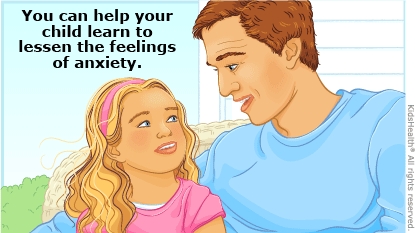Anxiety is when someone feels worried or nervous. It is common for kids to feel anxious sometimes. But when anxiety gets in the way of daily activities at home, at school, or with friends, your child needs your help. Work with your health care provider to help your child learn to manage feelings of anxiety.


Go to all care visits with the health care provider. If they recommend that your child see a behavioral health specialist (such as a psychiatrist, therapist, or counselor), be sure your child goes to these appointments.
Lowering stress can help with anxiety. Encourage your child to:
To help your child when they feel anxious:
Listen. Hear what your child has to say about their worries. Remind them that anxiety is a normal feeling. After your child has had time to talk about their worries, ask them if they want to read, draw, play, or do something else they enjoy.
Face the situation. Help your child slowly get used to situations that make them anxious. Doing this will help them see that these situations are not as bad as expected and that they can handle them. Getting used to a difficult situation can take time (days, weeks, or months), depending on the situation and how anxious your child is. It is important for your child to slowly move toward the situation rather than stay away from it. For example, if your child is nervous about going to dance class or basketball practice for the first time, try to have them start by going for a short time and then slowly work up to more time. Use gentle encouragement and positive support.
Offer support. Kids look to adults about how to act in new situations or those that may cause anxiety. Stay calm and let your child know you believe that they can face the fears. Say something like, "I know this is hard, but I know you can do it."
Teach positive self-talk. Work with your child to learn self-talk, such as "I can do this! I've done this before!" or "What's the worst that can happen?"
Teach relaxation. Young children may not know when they are feeling anxious. Talk to your child about what the body does when someone feels anxious — for example, the heart beats faster and breathing gets faster. Help your child practice ways to relax, such as deep breathing. Kids should first practice when they're feeling relaxed. Then they'll be ready to try it when they feel anxious.
Show your pride. Let your child know that you're proud of their brave behavior. Kids enjoy celebrating their efforts and successes with parents, and a small reward also can encourage them. You could spend time together doing something your child enjoys (like going to the park or getting ice cream).

Your child:

You are worried that your child will try to commit suicide (end their life) or they have talked about a specific plan for suicide.
You or your child can also call or text 988 or go to 988lifeline.org to reach the 988 Suicide & Crisis Lifeline. Someone is always available to help, 24/7.

What are some signs of anxiety in children? Kids with anxiety can't always show how they feel. Anxiety can show itself in other ways, such as:
What causes anxiety? Different things can lead to anxiety. Usually, there's no single cause. Going through a loss, trauma, or other hardship can make kids feel anxious. Sometimes it's not clear what led to the anxiety. Anxiety can also run in families.
How is anxiety treated? Health care providers help families understand anxiety and offer strategies that can help kids cope. If needed, kids can also meet with a therapist. It can take weeks to months of therapy to help some kids with anxiety. Sometimes doctors also recommend medicine.